7 Ways Routines Help You Heal & Thrive (+ How to Start One That Sticks)
Discover how simple routines can transform your life—emotionally and mentally. Learn how to start small and create lasting change.
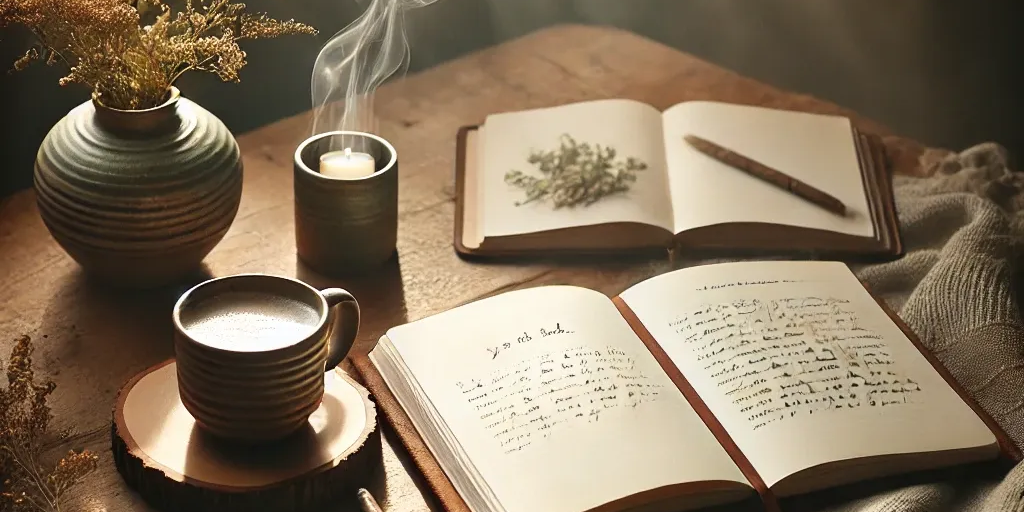
Let’s be real—when you hear the word “routine,” you might think of something boring or monotonous.
But here’s the twist: routines are kind of like unsung heroes. Sure, they may not wear capes or save the world in a single leap, but they quietly create stability, which is basically the superpower we all need.
Even some of the greatest minds—Barack Obama, Oprah Winfrey, and Richard Branson—credit their routines for their success. Spoiler alert: they’re not just about getting stuff done; routines can help with emotional healing, mood regulation, and even taming that wild subconscious.
If you're ready to dive deeper into how small habits can lead to big transformations, James Clear's video on building atomic habits offers powerful insights to help you turn routines into lasting change.
Every big transformation starts with one small step. No matter your goal, tiny changes today can lead to lasting results tomorrow.
For me? Routines are equal parts lifesaver and arch-nemesis. Living with ADHD has given me a love-hate relationship with structure. Sometimes I thrive with it; other days, I rebel and freestyle my way straight into chaos. Let’s just say impulsive decisions don’t always end well. (ADHD goals: routines are amazing... until they’re not, ya know?)
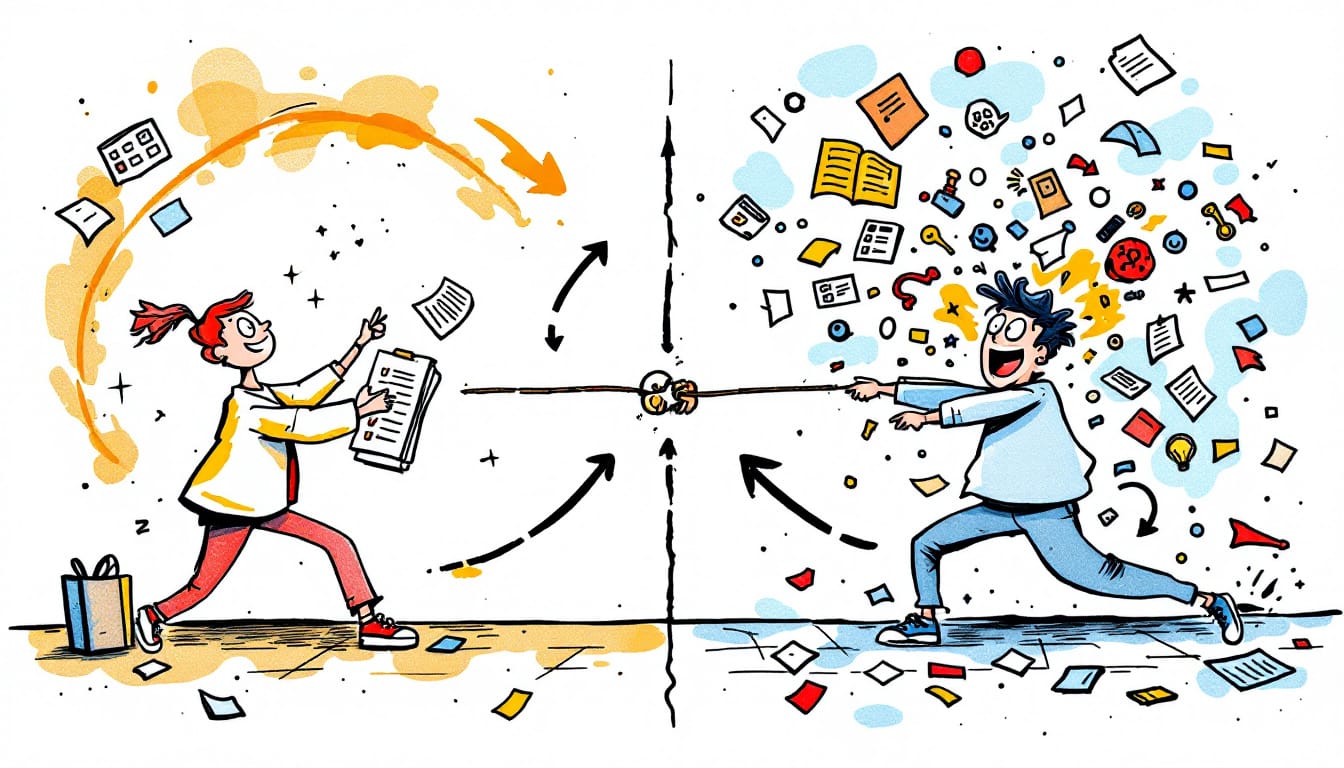
But here’s the truth I’ve come to embrace: routines don’t just keep your day in order. They have this sneaky way of shaping how you feel, think, and bounce back from stress. Trauma, for instance, throws routines out the window and leaves your subconscious flailing in fight-or-flight mode. But when you rebuild structure—through small, intentional habits—you can start reclaiming calm, stabilizing your mood, and resetting emotional responses.
So, routines? They’re more than just a checklist—they’re a lifeline. Let’s dive in.
📏 Lessons from Successful People’s Routines
What do the world’s most accomplished people do differently? They don’t just rely on motivation (because let’s face it, that runs out). They build routines that work like clockwork. Here are a few examples:

1. Barack Obama
- Starts his day with a workout to get the blood flowing—and probably to fend off getting cranky with Congress.
- Keeps things simple by wearing only gray or blue suits. (Because, honestly, who needs to waste brainpower deciding what to wear?)
- Values family time with dinner routines and wraps up with focused nighttime work.
2. Oprah Winfrey
- Wakes up naturally, no alarm needed—queen behavior.
- Centers herself with meditation and exercise because self-care is the ultimate flex.
- Builds her day around intentional reflection, reading, and personal growth.
3. Richard Branson
- Starts his mornings with something fun, like kitesurfing or tennis. (Because, obviously, billionaires have access to cooler activities than the rest of us.)
- Carves out time for creative brainstorming and balances it with family moments.
Key Takeaway
Pairing routines with habit stacking techniques can simplify your healing process and make routines easier to maintain.
❤️🩹 Why Routines Heal
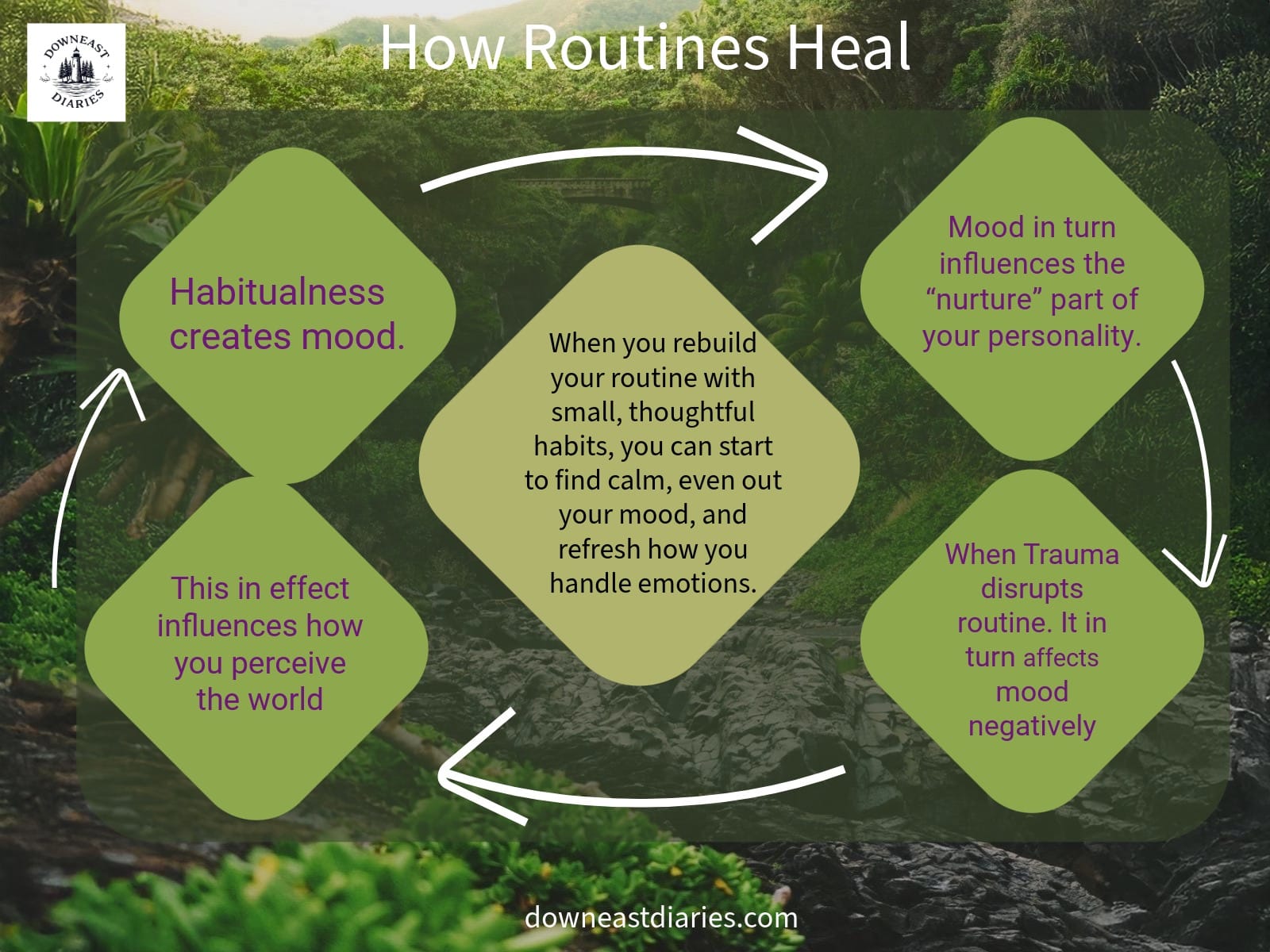
When life feels chaotic, routines become your anchor. They create space for calm, clarity, and progress—one small habit at a time.
Here’s the science-y part. Your brain loves predictability. It hates chaos because chaos screams, “We’re in danger! Sound the alarms!” When you implement a routine, it’s basically telling your brain, “Chill out. You’ve got this.” That’s why routines have such a profound impact on healing—both emotionally and mentally.
For me outdoor routines, such as daily walks, are key. Learn more in my post on how getting outside can fix almost anything.
1. Routines Influence Mood
Trauma studies have shown that unpredictable environments (ugh, life, right?) flip your fight-or-flight response into overdrive. Routines, on the other hand, are like a big security blanket for your brain. They tell the nervous system, “Hey, it’s cool. We’re safe here,” which keeps mood swings and overstimulation in check.
Key Insight:
Routines stabilize emotional chaos. Think of them as a soothing lullaby for your brain during stormy times.
2. Emotional Regulation Through Predictability
Ever spill your coffee, get a passive-aggressive email, and suddenly the day feels ruined? Yeah, same. Routines flip that script. By setting up intentional habits (like journaling before bed or planning your day ahead of time), you give yourself control. Let your logical brain steer the ship instead of letting emotions take the wheel.
Key Insight:
Structure your day, and everything—yes, even your emotions—falls in line.
3. Subconscious Rewiring
Here’s the juicy part: routines don’t just feel good—they change how your brain operates. Repeating positive habits literally rewires your neural pathways. It’s like carving a groove that makes the right behaviors automatic. (Warning: this works for bad habits too, so tread carefully!)
Key Insight:
When your routines align with your goals, they create subconscious momentum. It’s like giving your brain a productivity cheat code.
4. Turning Off Fight-or-Flight Responses
Remember that survival mode switch that gets triggered by chaos (or bad email tone)? Routines send the opposite signal: “All clear. No lions here.” Simple, consistent habits shift your body from panic to rest.
Key Insight:
Simple routines—like stretching in the morning or winding down with a tea ritual—turn survival mode into chill mode.
5. Building Confidence Through Familiarity
Every time you complete a habit, whether it’s making your bed or hydrating after coffee, you remind yourself: “I can do hard things.” These small wins snowball into confidence.
Key Insight:
Routines are like a hype friend reminding you, “You’ve got this—and you’ve done it before.”
6. Flow and Focus
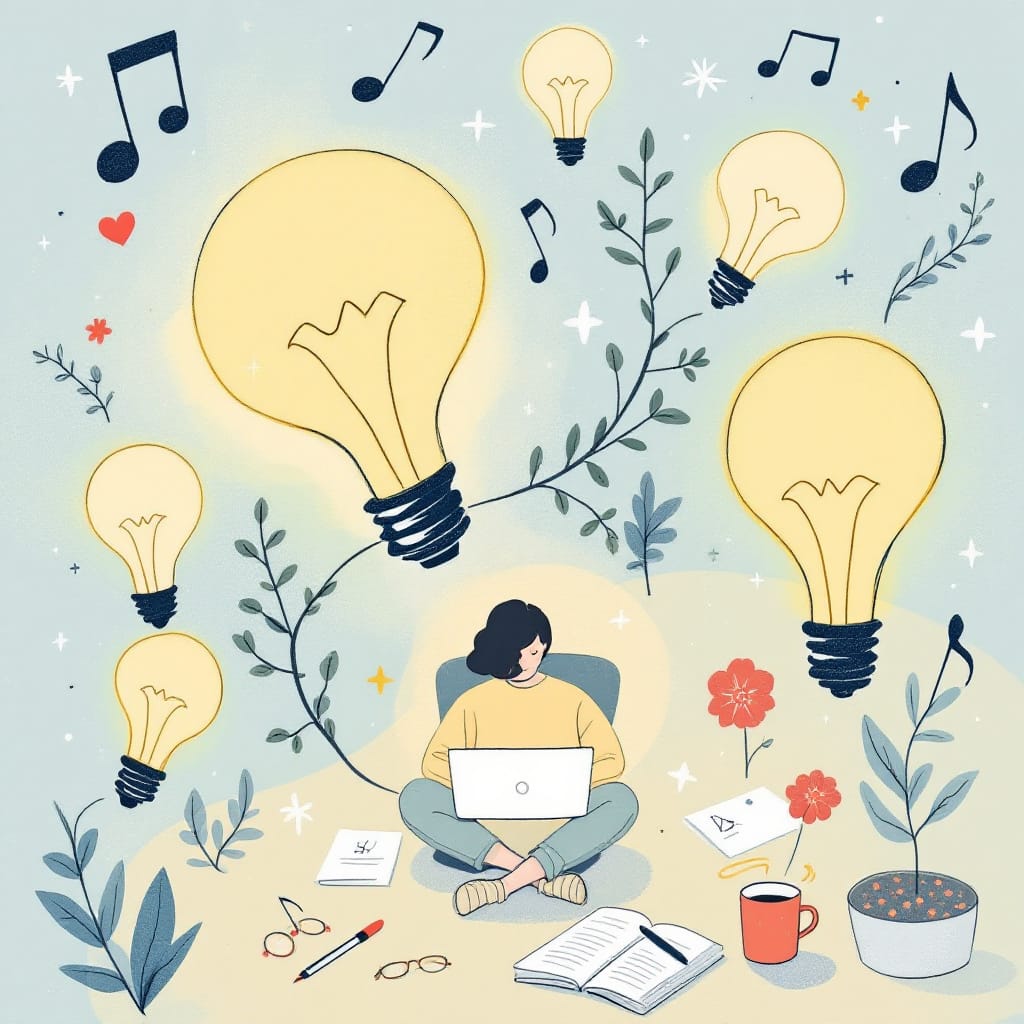
Routines clear the clutter in your head, setting the stage for flow—that wonderful state where you get in the zone and crush it. No distractions. Pure focus. It’s like hitting play on your brain’s greatest hits album.
Key Insight:
Want flow? Flow doesn’t just happen—it’s built on the foundation of predictable routines.
7. Routines Lessen Trauma's Long-Term Effects
The loss of routine can destabilize anyone, but for trauma survivors, it’s even tougher. Studies show that recreating even the smallest rituals—(aka routines) like consistent wake-up times or daily walks—helps rewire the brain’s and promote healing
Key Insight:
Tiny rituals create safety. They’re like therapy for your nervous system.
📓 Personal Reflection
Growing up, school routines were my safety net. When life felt unstable, I could count on that predictability. But during the pandemic, when my daughter lost her routine, I saw how much that disrupted her sense of safety and balance.
For me, routines and ADHD are a constant balancing act. Some days, I’m all in. Other days, I reject them entirely. But every time I come back to structure, I’m reminded—routines don’t box you in. They set you free.
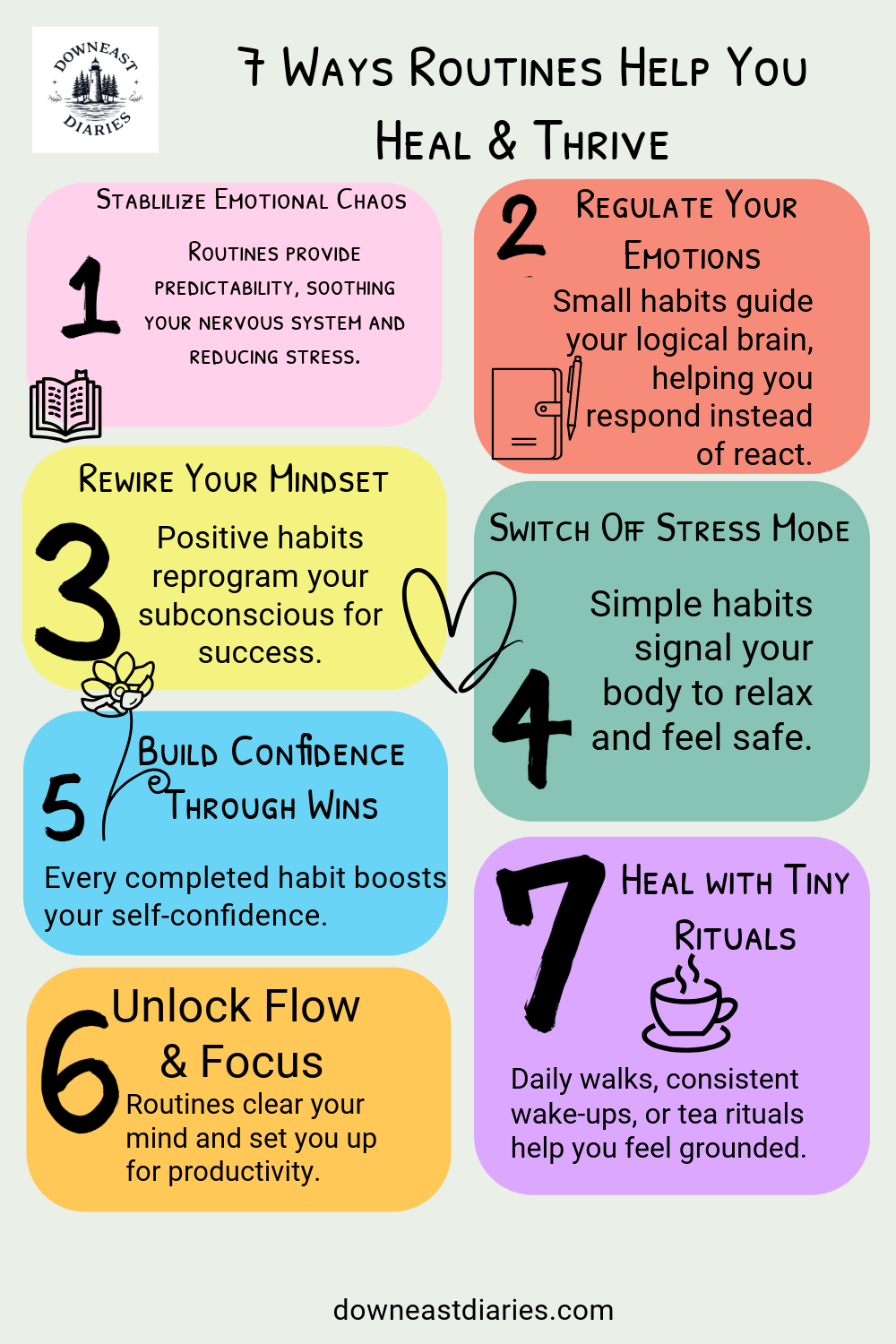
🪜 How to Build Positive Routines
Ready to get started? Here’s the game plan:
- Start Small:
Anchor one new habit onto something you already do. Brush your teeth? Add an affirmation. Make coffee? Take three deep breaths while it brews. - Balance Rigid and Flexible Routines:
Bad day? Adjust. Your routine should support you, not stress you out. - Track Progress, Reflect Often:
What’s working? What feels off? Will journal or habit-tracking apps make it easier to spot patterns? Adjust as needed.
The truth is, routines aren’t boring—they’re transformative. They’re the unsung heroes turning chaos into calm, uncertainty into stability. You don’t have to overhaul your life overnight. Start small. Choose habits that matter to you. And remember: every little win adds up to something bigger.
🌱 Let’s Heal and Grow Together.
Have a routine that works wonders for you? Share it in the comments—we want to hear your genius hacks! Don’t forget to subscribe for more practical tips on routines, self-care, and finding your flow. And if you’re looking for some positivity and connection, join our community—because healing happens best together.
Now go crush your day (and maybe stretch before you do). You’ve got this!
